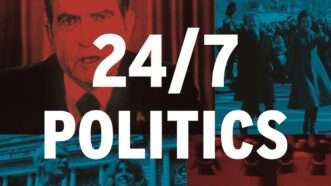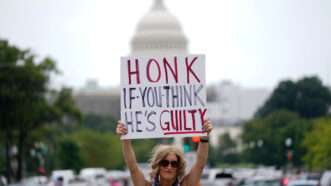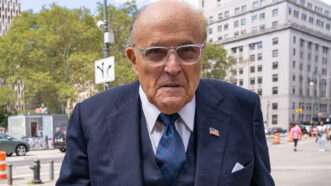Free Speech
The Battlefields of Cable
How cable TV transformed politics—and how politics transformed cable TV
Why Stripping Fox's Broadcast License Is a Terrible Idea
Plus: A listener inquires about the potential positive effects of ranked-choice voting reforms.
Cops Invented a Reason To Cite Man Who Flipped Them Off
Body camera footage shows that Delaware police cited Jonathan Guessford for flipping them off, even though they later agreed it was his right to do so
Owner of Kansas Newspaper Dies Amid 'Shock and Grief' After Police Raid
Plus: New Zealand libertarianism, Barbie economics, and more...
Journal of Free Speech Law: "Where's the Liability in Harmful AI Speech?," by …
Profs. Peter Henderson, Tatsunori Hashimoto, and Mark Lemley, just published in our symposium on Artificial Intelligence and Speech; more articles from the symposium coming in the next few days.
Journal of Free Speech Law: "Generative Artificial Intelligence and Trade Secrecy," by Prof. David S. Levine
Just published, in our symposium on Artificial Intelligence and Speech; more articles from the symposium coming in the next few days.
Journal of Free Speech Law: My "Large Libel Models? Liability for AI Output"
Just published, in our symposium on Artificial Intelligence and Speech; more articles from the symposium coming in the next few days.
A Louisiana Man Was Jailed for Criticizing Police. A Federal Court Wasn't Having It.
The decision supports the notion that victims are entitled to recourse when the state retaliates against people for their words. But that recourse is still not guaranteed.
Journal of Free Speech Law: "The European Liability Regime For Large Language Models"
"Is It a Platform? Is It a Search Engine? It's Chat GPT!," by Prof. Beatriz Botero Arcila, just published in our symposium on Artificial Intelligence and Speech; more articles from the symposium coming in the next few days.
Journal of Free Speech Law: "An AI's Picture Paints a Thousand Lies: Designating Responsibility for Visual Libel,"
by Prof Jon M. Garon, just published in our symposium on Artificial Intelligence and Speech; more articles from the symposium coming in the next few days.
Journal of Free Speech Law: "Bots Behaving Badly: A Products Liability Approach to Chatbot-Generated Defamation,"
by Prof. Nina Brown, just published in our symposium on Artificial Intelligence and Speech; more articles from the symposium coming in the next few days.
Review: The Peculiar Politics of Killer Mike
The rapper is a Bernie Sanders supporter who speaks out about gun rights and free speech.
Journal of Free Speech Law: "Section 230 Won't Protect ChatGPT," by Prof. Matt Perault
Just published, in our symposium on Artificial Intelligence and Speech; more articles from the symposium coming in the next few days.
Political Activist Brandon Straka Loses Jan.-6-Related Libel Lawsuit Against NBC
"The material challenged in the plaintiff's complaint cannot be understood by a reasonable person as anything but substantially, if not literally, true."
Journal of Free Speech Law: "Negligent AI Speech: Some Thoughts About Duty," by Prof. Jane Bambauer
Just published, in our symposium on Artificial Intelligence and Speech; more articles from the symposium coming in the next few days.
Alleged "Psychic Intuition" Isn't Enough to Make a Federal Claim "Plausible" Enough to Withstand Dismissal
An allegedly psychic "Internet sleuth" alleged a professor was involved in the University of Idaho student murders; the professor sued; then the "sleuth" countersued.
Why Kamala Harris Won't Be Asked About the Suicide of a Newspaperman She Persecuted
When it comes to conflicts with people engaged in unpopular or disfavored speech, too many journalists side with the feds.
A Ham-Handed Bill Attacks the First Amendment in the Name of Protecting Minors From Online Harm
The Kids Online Safety Act imposes an amorphous "duty of care" that would compromise anonymous speech and restrict access to constitutionally protected content.
Virginia Court Rejects Retroactive Attempt to Seal Name Change Records
The decision came despite the applicant's objection, ten months after the name change, that the change was needed to prevent "potential endangerment and/or discrimination through publicly disclosed record of the transgender applicant."
Here Is Why Trump's Lawyers Say His Post-Election Conduct Was Constitutionally Protected
When he alleged fraud and sought help from government officials, they say, Trump was exercising rights guaranteed by the First Amendment.
Have We Lost Track of the Trump Indictments Yet?
Plus: Why don't journalists support free speech anymore?
Risk of Physical Harm to Woman Involved in Ghislaine Maxwell Litigation May Justify Sealing Her Identity,
holds the Second Circuit, though it leaves it to the trial court to consider the facts further.
Who Can Use Twitter's Offer of Legal Fees "If You Were Unfairly Treated by Your Employer Due to [Tweets]"?
More people than one might imagine, chiefly because many states, counties, and cities have laws that ban private employers from discriminating against their employees based on certain kinds of speech.
Alex Winter: Is The YouTube Effect Good or Bad on Balance?
A new documentary film argues that the second-largest website on the planet is flooded with misinformation. Is that right?
Introducing the Reason Crossword, a Weekly Puzzle for Libertarians
"Until today, there was no such thing as a free market–focused crossword puzzle," says Stella Zawistowski.
College Ban on "Inappropriate or Offense Language or Themes" in Bulletin Board Postings Struck Down
The case involved Young Americans for Freedom postings about "Leftist Ideas" and about abortion.
"Providing Information About or Referring Patients to Legal Out-of-State Abortion Services" Is Protected …
by the First Amendment, even if the abortion would be illegal in the state, holds a federal judge in Idaho.
UVA Dean of Students 'Purposefully Tampered' With Investigations Into Student's Speech, Lawsuit Claims
UVA found "insufficient evidence" to conclude that Morgan Bettinger called protesters "good speed bumps." They punished her anyway.
Doug Stanhope: 'Nothing Stands Above Everything Else. Everything Annoys Me Equally.'
The libertarian comedian on why he's dreading the presidential election season, how he survived COVID, and why he needs to do more psychedelics.
Backpage Founder, Alt-Weekly Entrepreneur, and Free Speech Warrior James Larkin Has Died
Larkin, 74, took his own life on Monday, just a little over a week before he was slated to stand trial for his role in running the web-classifieds platform Backpage.
Doug Stanhope: 'Everything Annoys Me Equally'
The comedian has entertained audiences with his bad taste and unapologetically libertarian tirades for nearly 30 years.
Journal of Free Speech Law: "The Application of the New York Anti-SLAPP Scheme in Federal Court,"
by Matthew L. Schafer & Tanvi Valsangikar, just published, through our normal blind review process.
The Democratic Governor Who Wants Drug Legalization and Free Markets
"Government in general does a lot of things that aren't necessary," says Jared Polis.
Journal of Free Speech Law: "The 'Constitutional' Rise of Chinese Speech Imperialism," by Prof. Ge Chen
Just published, through our normal blind review process.
Crisis Pregnancy Centers File Free Speech Suits Over Illinois and Vermont Laws
Plus: California tries to stop professors from testifying in suit over COVID education policies, state Republicans aren't all abandoning free market economics, and more...
Giuliani Admits His Oft-Told Tale of Georgia Election Fraud Was Not True
Unlike calling Trump's stolen-election fantasy "the Big Lie," his lawyer's statements were demonstrably false assertions of fact.
Federal Court Blocks Arkansas Law That Limits "Harmful to Minors" Books in Libraries and Bookstores, and Also
limits "inappropriate" books in libraries.
Jean Twenge and Elizabeth Nolan Brown: What Do Millennials Want?
A boomer, a Gen Xer, and a Millennial discuss the causes and conflicts of today's generational gaps.





















